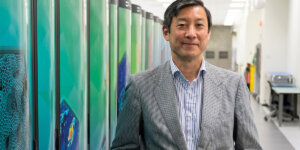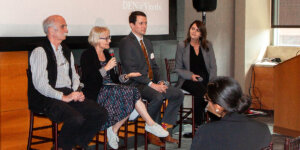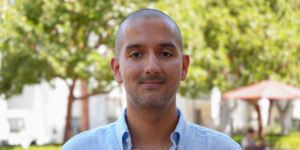
USC’s AI applications minor has generated a lot of student excitement (Image/Allen Bolourchi)
Driven by artificial intelligence, the so-called Fourth Industrial Revolution promises to transform the world through technological advancement. Last year, against this backdrop, the USC Viterbi School of Engineering introduced a new minor in the school’s Information Technology Program, or ITP, to prepare students for the exponentially changing present and future. Currently, this innovative minor has already attracted 354 students, reflecting the growing interest and relevance of this field.
“I was wondering, what is the next big thing in technology…I wanted a fully dedicated minor around AI,” said Nitin Kale, professor of information technology practice and the creator of the minor.
The new minor and the ITP program live in a “school within a school” — USC Viterbi’s recently launched USC School of Advanced Computing.
The artificial intelligence applications minor is a transformative program designed to provide students with cutting-edge skills and knowledge. The 22-unit minor, which combines theory and practical applications, just graduated its first cohort of students in May 2024.
Artificial intelligence is revolutionizing various industries, including healthcare, finance, entertainment and education. For USC Viterbi students like Peter Wu, gaining knowledge in the field of AI will become essential to fully utilize available resources.
“When Chat GPT came out, I thought this is pretty revolutionizing tech. I need to learn more about,” said Wu, a dual major in physics and computer science (CS) pursuing a Progressive Degree Program (PDP) master’s degree in CS. He plans to work as a machine learning engineer post-graduation.
The demand for professionals proficient in AI applications is rapidly increasing as industries grow. Considering that USC is the No. 2 feeder school to Silicon Valley companies, according to statistics published by College Transitions, it seems likely that the AI applications minor will put Trojans in a good position to ride the AI wave professionally. For some, this minor has already benefited them professionally.
“The skills I learned in this minor will be very applicable to my job in the future,” said Wu.
Kale, an ITP faculty member with nearly three decades of experience, has been a driving force in integrating technology education across diverse disciplines. He previously led the successful launch of the enterprise information systems minor in 2012, the applied analytics minor in 2016, which became the most enrolled minor at USC in 2020, as well as the blockchain minor in 2019.
Professor Kale advocated for the AI applications minor to bridge the gap between AI technology and real-world applications.
“Our goal,” Kale said, “was to create a curriculum that not only covers the fundamentals of AI but also emphasizes its practical uses.”
The minor is open to all majors, allowing students from diverse fields to collaborate and learn from one another. When asked about his favorite part of the minor, Wu said: “Working in group projects with students from different majors felt like a team because we played off of each other’s strengths. It made me feel like no one was really leading.”
Allen Bolourchi, a USC Viterbi adjunct professor in Generative AI and a manager with Meta AI, FAIR (Fundamental AI Research) teaches ITP 459 – Applied Machine Learning for Natural Language Processing and Generative AI. He said the new minor’s hands-on approach gives “students invaluable experience through practical projects. They first learn to understand the underlying algorithms in generative AI before building AI models and applying AI in innovative ways.”
The new minor also seeks to build upon a foundation in ethics. This sentiment dovetails nicely with the vision of USC President Carol Folt, who as part of her USC Frontiers of Computing initiative — the most ambitious academic program in USC’s history — articulated a need for ethics to be at the core of advanced computing, data science and AI.
Said Folt in 2023: “I want every student who comes through our programs, whether they are in science, business, the humanities or the arts, to have a solid grounding in technology and the ethics of the work that they do. We will integrate digital literacy across disciplines to create responsible leaders for the workforce of the future.”
Published on October 31st, 2024
Last updated on October 31st, 2024












